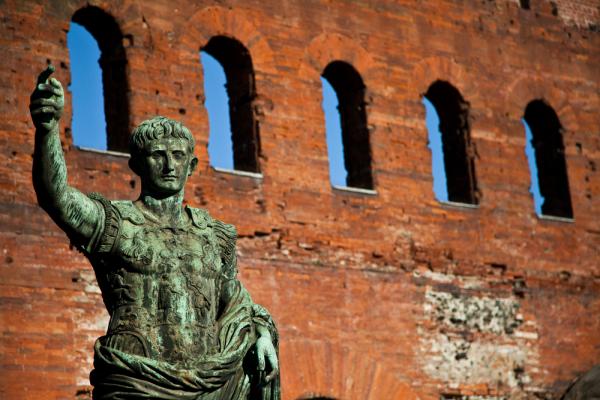Stop me if you’ve heard this story before. It’s familiar to many.
The story features a culture that treats people like commodities, valuing them only insofar as they produce wealth.
It describes a society that closes ranks against outsiders, concluding that foreign people and ideas are detrimental to established values and incompatible with true patriotism.
It tells about a system that regards punishment and incarceration as easy solutions, preferring the blunt weapons of shame and quarantine over the constructive tools of dialogue and rehabilitation.
I told you it was familiar.
Abuses Suffered, Abuses Exposed
The particular story I have in mind, though, appears in Acts 16:16-40, a scene in which Paul and Silas, two traveling preachers, find themselves publicly stigmatized by a culture that sees them as threats.
When this story of antagonism and dispute reaches its end, God has delivered the victimized missionaries. Like many of the stories in the book of Acts, this one operates with a rather simplistic moral vision: Its protagonists are miraculously preserved and its culprits easily defeated.
We know real life is more complicated. The story, therefore, must not be about guaranteeing get-out-of-jail-free cards to everyone who is truly faithful in God’s eyes. Instead it’s like a parable that starkly illustrates the dynamics and abuses of power.
To compare this passage to a parable doesn’t mean we take it lightly. It means we pay attention to how the passage works. Not every biblical text functions in the same way. Sometimes they provide access to ancient wisdom (or foolishness). Sometimes they make bold claims about God and how to recognize God’s intentions. Sometimes they hold up a mirror and show us what we look like. This story from Acts does many things, but at one level it is very much one of these mirrors, especially for those of us who live in a place that loves to remind itself that it is “the most powerful nation on earth.”
What might we learn from looking in this mirror? What kind of world does it depict?
Like many of us, the people of Philippi who populate the scene in Acts 16 knew what it meant to belong to an extraordinarily powerful society. Located in Macedonia, Philippi was a Roman colony, a special kind of city that served as a cultural outpost within the Roman imperial system, maintaining uniquely close political and economic ties to Rome. The small city’s residents included many descendants of Roman soldiers who had fought under the command of Rome’s first emperor, Augustus, several decades prior. Prime land in the colony was the reward for their loyalty.
The Roman Empire provided many benefits to those who lived within its borders, whether these people were loyal residents fortunate enough to dwell in a favored colony, elites who enjoyed full citizenship, or even conquered peoples living in occupied lands. (Even the People’s Front of Judea grudgingly recognized this last point.) The empire maintained its operations with ruthless efficiency, however. Rome exercised a totalizing influence over all who were within its reach, for this is what empires do in their drive to remain wealthy, powerful, and manageable.
If we take Roman Philippi as a microcosm, the story in Acts 16 starkly illustrates specific things empires do:
- Empires promote their strength by exploiting gods and their symbols of power. Ancient audiences would have connected the “spirit of divination” in the anonymous slave girl with the god Apollo’s divinatory powers. Imperial gods require disciples to guard their reputations zealously. Anyone who bests Apollo’s power can expect some kind of retaliation, lest Rome look bad.
- Empires discard people who have no worth. When the spirit leaves the slave girl, she becomes a depleted resource to her owners. Evidently Paul also overlooks her value as a person. She quickly disappears from the scene. No one cares what she thinks or what will befall her.
- Empires show great skill in the art of scapegoating. It allows them to identify enemies, turn crowds against those enemies, and finally punish them. When people include the detail “they are Jews” in their accusations against Paul and Silas (who were indeed Jews, Jews who followed Jesus), it’s an instance of ethnic and religious scapegoating. By charging these foreigners with sowing anti-Roman subversions, the slave owners know they can harness the power of popular resentment.
- Empires torture, for they believe their own eminence and fear entitle them to cruelty. When the magistrates strip and beat Paul and Silas in public, is it an “enhanced interrogation technique” or raw torture? No matter. Who thinks of making such distinctions? No one in Philippi objects, just as no one considers how deeply the wounds will sink into the tortured prisoners, the torturers, and those who witness the dehumanizing brutality.
- Empires consolidate their power by confining whatever they cannot control. Paul and Silas go to prison, where they are physically restrained. Branded as dangerous to others’ way of life, they disappear from public view, stored away in cells. Shackles identify Paul and Silas as deviants. Walls promise to halt their influence.
- Empires refuse to admit defeat. They avoid being called to account in a public way, which might imply weakness and disgrace. When an earthquake — obviously meant to signal an act of God in this story — overmatches the empire’s efforts to isolate Paul and Silas, the magistrates dispatch their deputies, hoping the prisoners they dishonored will now quietly leave town.
In the end, the story does more than show us how powerful societies — whether ancient or modern — try to keep a grip on their dominance. While Acts 16 describes a steady stream of self-preservation that issues from the villains in Philippi, the story’s main point is to celebrate a divine victory.
Power Plays
The victory comes when everything gets turned upside down. As soon as the earthquake shakes open the prison, the God of Paul and Silas proves to be more powerful than any other supernatural or political force. Paul and Silas reveal that they can be just as Roman as they are Jewish. The jailer washes the wounds of those who were recently his prisoners. Walls and locks lose their ability to keep people caged. The magistrates who previously humiliated others find themselves humiliated when Paul demands a public apology from them.
Even with all its violence, brute force, and chest-thumping, this story has a burlesque current running through it. It aims to delight a sympathetic audience by extoling the power of a God who cannot be overwhelmed or thwarted by an empire’s attempts to clutch its prerogatives and assert its pretentions. This particular scene makes the problems and their solutions appear rather easy — too easy. But its purpose is to reassure and embolden its readers, people who knew the realities of the Roman Empire very well, not to promise a divinely orchestrated way out of each and every hardship.
The ease of the story’s solution amplifies the beauty of its burlesque streak. Burlesque exposes empires’ pride and abuses, even as it acknowledges that there is no effortless escape from imperialistic ways of thinking. Just like geopolitical empires, these ways of thinking and controlling never go away. Victims of empires tend to create their own when given the chance. History shows that churches imitate and partner with oppressive regimes as well as they boldly combat imperial injustices.
The good news according to Acts 16 is that God’s intentions cannot finally be thwarted by obstacles put in the way by individuals, governments, societies, or bald imperial pretentiousness. If those things position themselves to obstruct God’s designs, God reserves the right to overturn them. Sometimes, whether through experiencing suffering, through prophetic satire, or through defiant countermeasures, God just makes a statement.
Taken to an extreme, behavior like this could paint God as coercive and peevish. With regard to the scene in Acts 16, God’s earth-rattling statement declares that God doesn’t want certain societies to presume they know the right ways to preserve liberty and justice for themselves. After all, some cultures need a firmer kick in the pants than others to get over their arrogant presumptions and their love of power.
God’s statement in Acts 16 reminds us of the one thing that our imperialistic cultures try hardest to make us forget: other realities are possible.
A couple of paragraphs in this piece were adapted from my book Intrusive God, Disruptive Gospel: Encountering the Divine in the Book of Acts , published by Brazos Press.
This article originally appeared at On Scripture.
Got something to say about what you're reading? We value your feedback!

